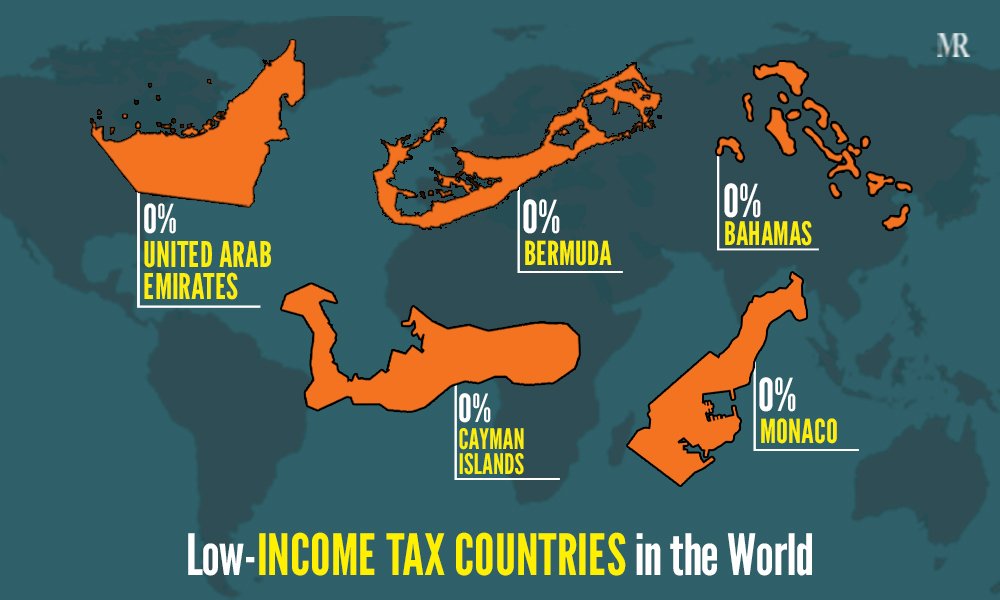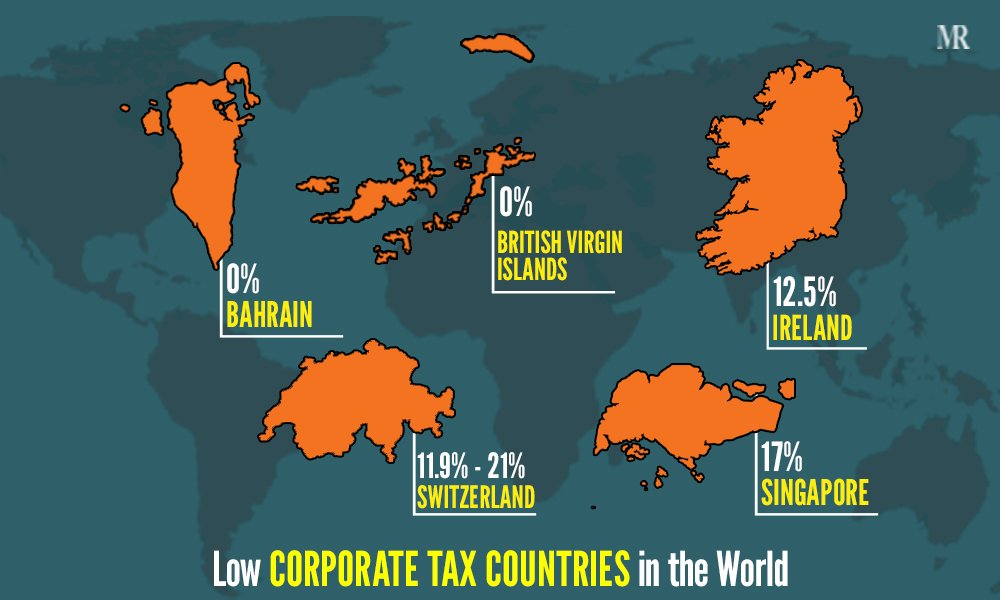In 2024, Low Tax Countries will be a hot topic for those aiming to save on taxes.
We’ll uncover the nations where you can enjoy more earnings, spend less on purchases, and keep your business costs down.
Join us as we explore the top low tax countries that could give your finances an edge this year.
This blog post will delve into the countries with the most favorable rates across three key categories:
- Income tax
- Sales tax
- Corporate tax.
Low-Income Tax Countries in the World

Albert Einstein once stated, “The hardest thing in the world to understand is income tax.” And it is true up to a certain extent.
Income tax regulations are filled with jargon, deductions, and exclusions, making it difficult for the average person to understand what they owe. Depending on the nation and its tax code, there can be differences in the complexity of understanding income tax.
In this listing, we are mentioning top-income tax haven countries that everyone would love to be a resident of.
1. United Arab Emirates
- Economy Size: $536.83 Billion (2024)
- Income Tax Rate 0%
The UAE is regarded as a lively and interesting country with much to offer. It has a thriving economy, a rich cultural legacy, and world-famous landmarks, including the Burj Khalifa, Palm Jumeirah, and Louvre Abu Dhabi.
The UAE is also a commercial, tourism, and entertainment destination, with a vibrant nightlife scene and a year-round calendar of sports and cultural events. Overall, the UAE is a vibrant and diversified country that offers something for everyone. It has one of the most stable and strong economies in the Middle East. The IMF report predicts 4.01% and 4.15% annual GDP growth in 2024 and 2025, respectively.
Currently, there is no personal income tax in the United Arab Emirates. As a result, there are no individual tax registration or reporting requirements. The UAE has no federal or Emirate-level personal income tax. Therefore, you are not required to file income tax returns or pay taxes on your salary.
UAE belongs to one of the highly preferred countries for low tax countries.
2. Bermuda
- Economy Size: $7.55 Billion (2023)
- Income Tax Rate 0%
Situated in the North Atlantic Ocean, Bermuda is a British Overseas Territory. It is the oldest and most populous of Britain’s overseas territories. The group consists of around 138 coral islands and islets.
Bermuda’s economy is built on insurance and other financial services, which account for around 85% of the island’s GDP. Tourism is Bermuda’s second largest industry, accounting for approximately 5% of GDP but a far greater share of employment.
Bermuda has no income tax since it is an offshore financial center, allowing it to operate outside of most countries’ tax jurisdictions. This means that people and businesses based in Bermuda are not required to pay taxes in their home countries.
Instead, Bermuda’s tax structure is clear and open, with a 15% global corporate tax. This draws enterprises to the island, making it a popular destination for international trade. Furthermore, Bermuda has been attempting to increase its tax transparency and lessen its reputation as a tax haven.
3. Bahamas
- Economy Size: 12.9 Billion (2022)
- Income Tax Rate 0%
The Bahamas is one of the most livable nations, with no income tax. Obtaining a temporary residency visa is as simple as paying $1,000 at the immigration office, and it is renewed annually.
The Bahamas’ economy is rebounding rapidly, fueled by massive tourism inflows. Tourism, banking, cement, oil transshipment, salt, rum, pharmaceuticals, and spiral-welded steel pipe are some of its major industries.
Despite being a small island developing state, the Bahamas has a high GDP per capita of $31,458, according to the World Bank. Inflation has been declining since mid-2022. With a significant rebound in tourism, the current account deficit is expected to fall to 6.2 percent of GDP in 2023 (from 8.2 percent in 2022).
4. Cayman Islands
- Economy Size: $6.84 Billion (2022)
- Income Tax Rate: 0%
The Cayman Islands is another British Overseas Territory located in the Caribbean Sea, known for its tax-free status. The islands do not have a corporate income tax, capital gains tax, or estate tax. This is primarily because the Cayman Islands do not have their own government and rely heavily on financial services to maintain their economy.
They also have a strong financial services industry, which attracts many multinational corporations looking for tax-efficient locations. However, individuals who reside on the islands are subject to UK income tax on their worldwide income.
5. Monaco
- Economy Size: $8.78 Billion (2022)
- Income Tax Rate: 0%
Monaco became one of the first governments to abolish income taxes in 1869. The liveability score is naturally high, but you’ll need to make a lot of money to afford the lifestyle. It is one of the easiest tax-free countries to become a citizen of.
Monaco banks need a minimum deposit of 500,000 to 1,000,000 euros to initiate a citizenship application. It boasts one of the world’s lowest crime rates. Thus, one of the top low tax countries in the world is attracting many billionaires.
The state maintains monopolies in several industries, including gambling, tobacco, the telephone network, and the postal service. The late nineteenth century saw the inauguration of the rail link to France and the Monte Carlo Casino, which boosted economic growth. Monaco’s economy presently focuses mostly on banking, services, and real estate.
Low Corporate Tax Countries in the World

Another list of low tax countries mentions the corporate tax favorable nations. Economic reform is necessary to keep the GDP afloat. Corporates functioning uninterruptedly indicates, steady growth. Hence, these listed countries understand this and try to attract as many as possible.
1. Bahrain
- Economy Size: $47.12 Billion (2024)
- Corporate Tax Rate: 0%
Bahrain is the third-smallest country in Asia. Bahrain became the first post-oil economy in the Persian Gulf through decades of investment in banking and tourism. Hence, many of the world’s major financial institutions are present in the country’s capital. The World Bank recognizes it as a high-income economy.
Petroleum is Bahrain’s most important export product, accounting for 60% of export receipts, 70% of government revenue, and 11% of GDP. Aluminium is the second largest exported product, behind finance and building materials.
Bahrain has no taxes on income, sales, capital gains, or estates, with the exception, of restricted situations. The firms (local and foreign) that participate in the oil and gas sector or generate revenues from extraction or refinement are taxed under a fixed number. A 46% tax rate is charged on net profits for each tax accounting period, regardless of the taxpayer’s residency. Bahrain is another highly preferred country among low tax countries.
2. British Virgin Islands
- Economy Size: $500 Million (2019)
- Corporate Tax Rate: 0%
There are no corporate taxes, capital gains taxes, wealth taxes, or any taxes that a British Virgin Islands (BVI)company must pay. These corporations continue to be exempt from income taxes and stamp duties on any instruments or deeds relevant to company activity, including the transfer of all property to or by the company, as well as securities transactions.
However, several frequent misconceptions about the British Virgin Islands are untrue. The jurisdiction follows global norms for the transmission of information between competent tax authorities regarding citizens’ income and assets.
The information is shared periodically and in response to specific requests from foreign tax authorities. There is also an extremely effective system for sharing information with overseas law enforcement to counteract illegal financing. This is in addition to a strong regulatory framework for anti-money laundering and counter-terrorism financing efforts. Therefore, the British Virgin Islands are among the favorite low tax countries.
3. Ireland
- Economy Size: $629.59 Billion (2024)
- Corporate Tax Rate: 12.5%
Ireland, a beautiful, water-locked nation, is one of the most preferred offices for corporations. Ireland only levies a corporate tax rate of 6.25% on income derived from intellectual property or patents held by businesses. This reduced rate is meant to provide tax breaks to protect and support intellectual property royalties. Its development as a low corporation tax regime can be traced back to 1956 when it implemented tax breaks on export profits.
Ireland’s financial system allows for the establishment of special-purpose entities (SPVs) to reduce taxes.
Ireland’s tax regulations on R&D roles provide significant incentives for firms to invest in creative concepts. Ireland has implemented laws that allow R&D-intensive start-ups to seek back taxes. This is true even if the startup is losing money and unable to pay corporate taxes. In addition, the 25% tax credit is applied to a corporation tax rate of only 12.5%.
This clearly highlights, why Ireland belongs to the list of one of the highly preferred countries for low tax countries.
4. Switzerland
- Economy Size: $977.95 Billion (2024)
- Corporate Tax Rate: 11.9% – 21%
Switzerland lies in the middle of Europe, between the Alps and the Jura mountains. It is a rich, modern, and liberal market economy with a low unemployment rate, a highly skilled labor force, and a per capita GDP.
Switzerland’s economy benefits from a well-developed service sector, dominated by financial services. It boasts a robust manufacturing sector that specializes in high-tech and knowledge-based production. Furthermore, it boasts a well-developed pharmaceutical and chemical industry.
To take advantage of Switzerland’s business tax incentives, one must first comprehend its political pyramid. The federal CIT (Corporate Income Tax) rate is 8.5% on profit after tax (7.83% on profit before tax). Additionally, depending on the company’s corporate residence location in Switzerland, cantonal and communal CITs are added to the federal CIT. This provides an overall effective tax rate ranging from 11.9% to 21.0%.
It is very obvious Switzerland has to be in the favorable low tax countries.
5. Singapore
- Economy Size: $520.97 Billion (2024)
- Corporate Tax Rate: 17%
Businesses operating in Singapore, both residents and non-residents, are subject to taxes on both their income originating in Singapore at the time of receipt and their income originating abroad at the time of remittance or assumed remittance to Singapore. Non-residents are subject to WHT on specific types of income (e.g., interest, royalties, technical service fees, rental of moveable property) that are presumed to originate in Singapore.
Singapore uses a one-tier taxation structure, which means that all dividends paid by Singapore-resident firms are tax-free in the shareholder’s hands. This makes Singapore to be one of the favorite low tax countries for many entrepreneurs.
There is a partial tax exemption on income at the standard rate. 75% of the first 10,000 SGD is tax-exempt, for a total of 7,500 SGD. For the following 190,000 SGD, 50% is excluded, totaling 95,000 SGD. The total exempted income is 102,500 SGD.
In addition, income at the standard rate is exempt from start-up taxes. 75% of the first 100,000 SGD is exempt, which is 75,000 SGD. For the next 100,000 SGD, 50% is excluded, totaling 50,000 SGD. Total exempt income is 125,000 SGD.
Low Sales Tax Countries In The World

Value-added tax, or VAT, is not the same as sales tax. VAT is a tax levied on the added value of goods and services throughout the production or distribution process, whereas Sales tax is a tax levied on the purchase price of goods and services. In short sales tax is paid by end consumers, and VAT is paid by merchants in the supply chain.
In certain countries, VAT is referred to as a sales tax. However, they differ in principle and computation.
1. United Arab Emirates (UAE)
- Economy Size: $536.83 Billion (2024)
- Sales Tax Rate: 5%
UAE is one of the most visited countries. Hence, tourism and employment kicks in. It even acts as a junction where several travelers have connecting flights. Dubai’s international airport is the busiest in the world for international passengers.
Dubai’s government has several plans to mitigate shrinking economic possibilities. Imposing sales tax and VAT are part of that plan. These small steps are being taken to reduce dependence on fossil fuel income.
2. Brunei
- Economy Size: $15.99 Billion (2023)
- Sales Tax Rate: 0%
Taxes are seen as a way for governments to generate revenue from the public. Brunei has zero sales tax because it is one of the wealthiest countries in the world, with a very stable economy and a high standard of living. However, Brunei’s government has amassed a significant amount of wealth over the years through its oil and gas industry and does not need to rely on taxes as a primary source of revenue.
Additionally, Brunei’s government values economic stability and has chosen not to introduce a sales tax to avoid creating any potential economic instability. Brunei also has a large foreign exchange reserve, which cushions its economy during periods of global economic downturn. Therefore, this tiny country takes the spot among the top low tax countries.
3. Bahrain
- Economy Size: $47.12 Billion (2024)
- Sales Tax Rate: 10%
Being a petroleum-based small economy, Bahrain earns enough to keep its financial accounts stable. As mentioned earlier, Bahrain charges zero tax on corporate earnings. However, they charge a certain percentage on particular business transactions.
In the same way, the Bahrain government is beginning to reform its economic practices. Bahrain has launched a series of labor reforms under Minister of Labour Majeed Al Alawi as part of its efforts to establish a modern economy, bringing the labor market in line with international standards.
Bahrain aspires to increase its high-tech businesses, invest in R&D, and boost its competitive position in the global economy. In 2006, it was announced that the Bahrain Science and Technology Park, a Kuwait Finance House Bahrain initiative.
It reflects the effort to diversify the economy and provide high-quality jobs for local and international workers. These efforts are made to foster innovative and inventive thinking that would benefit the island nation directly.
4. Oman
- Economy Size: $112.35 Billion (2024)
- Sale Tax Rate: 5%
Petroleum accounts for 64% of total export earnings, 45% of government revenues, and 50% of GDP. The petroleum products business is one of the most important sectors in the Omani economy, accounting for half of the Sultanate’s GDP.
The country has a diverse economy that is heavily reliant on oil and gas exports. The administration has implemented several economic diversification projects to minimize the country’s dependency on energy exports and promote sustainable growth.
Oman plans to diversify its economy by investing in manufacturing, logistics, tourism, mining, and fisheries. In addition, the government is monitoring the development of various food-related programs aimed at improving long-term food security.
The Oman Investment Authority (OIA), Oman’s sovereign wealth fund, is involved in the privatization and sale of state-owned assets.
5. Switzerland
- Economy Size: $977.95 Billion (2024)
- Sales Tax Rate: 8.1%
With tech innovation, Switzerland’s beautiful landscape also supports some farming businesses. It contributes around 1% of the country’s GDP. The country is also recognized for its wine and chocolate production. Switzerland enjoys a high level of living and is usually recognized as one of the world’s most secure and stable countries.
Switzerland has one of Europe’s lowest rates of VAT (Sales Tax). The majority of products and services are subject to an 8.1% VAT rate. Accommodation services are subject to a reduced rate of 3.8%, whereas ordinary commodities are subject to a 2.6% tax.
Switzerland invests approximately CHF 23 billion per year in research and development (R&D), which accounts for roughly 3% of GDP. The private sector accounts for more than two-thirds of this amount.
Conclusion
These above-mentioned low tax countries are listed on several factors that make them attractive destinations. If you are interested in knowing about the highest tax countries, click the link.
Note: The data has been extracted from several websites and sources. Mainly it was gathered from the International Monetary Fund, World Bank, and several government websites.
Keep Reading! Keep Growing!












